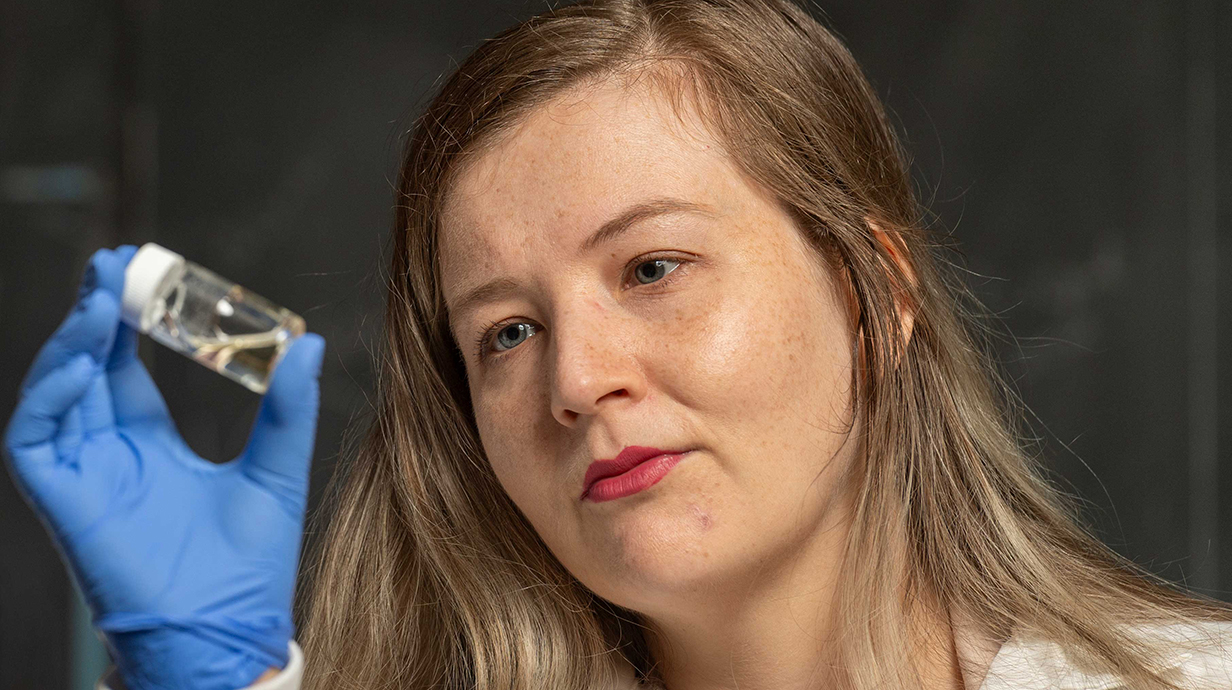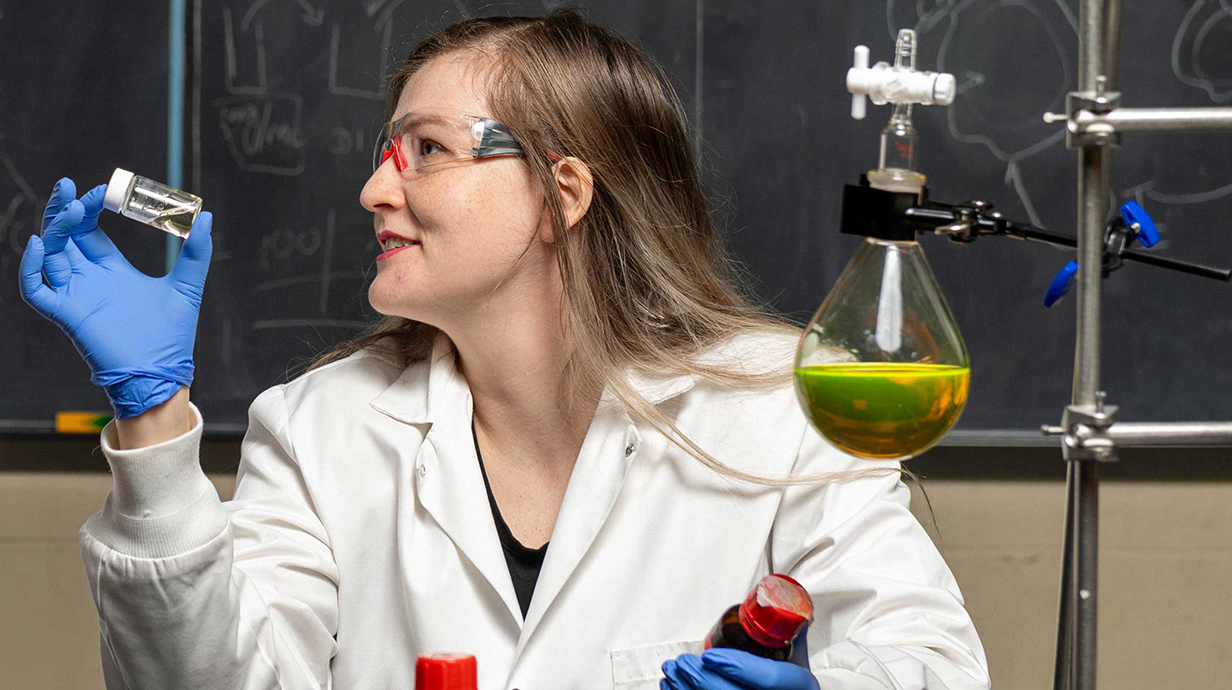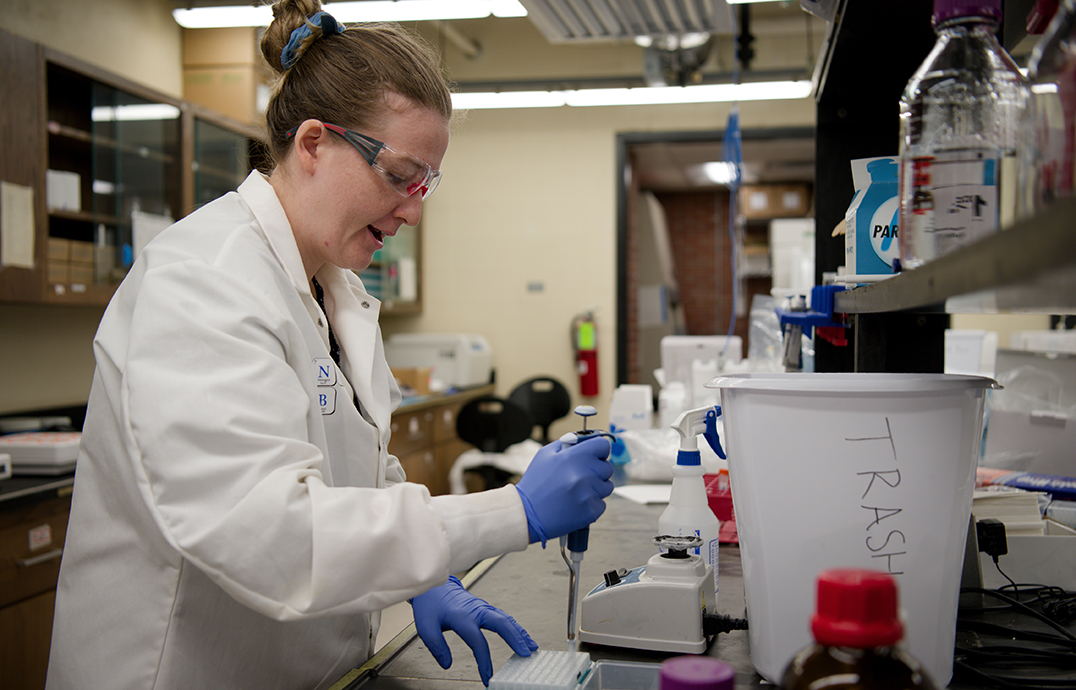National Publication Recognizes UM Chemist as Trailblazer
Award honors Eden Tanner's innovation in chemistry, commitment to accessibility

OXFORD, Miss. – A news magazine published by the American Chemical Society has selected University of Mississippi chemist Eden Tanner as one of its 2025 Trailblazers, which recognize the contributions of disabled chemists in science, technology, engineering and mathematics fields.
Tanner is an assistant professor of chemistry and biochemistry and co-director of the Center for Nano-Bio Interactions at Ole Miss.
The annual Trailblazers issue of Chemical & Engineering News highlights chemists and engineers who are making significant contributions to science while serving as leaders and role models. The issue takes on a new theme each year, and the 2025 issue focuses on disabled researchers.
"Disability is unique because it is something that is likely to happen to most, if not all, of us, if we're lucky enough to live long enough," she said. "So being flexible and accessible means that no matter what happens to anyone at any given moment, you can still make sure that they're able to do what they want or need to do.

Eden Tanner is honored as a 2025 Trailblazer by Chemical & Engineering News in an edition that highlights researchers with disability. Tanner has built accessible features into her Ole Miss lab to ensure that it is open to all researchers. Photo by Srijita Chattopadhyay/Ole Miss Digital Imaging Services
"That might mean that you need to approach things differently, but there's value in that. Most of the time when we innovate, it's because we've approached things differently."
The publication's editors selected 12 chemists from across the world to show how researchers with disabilities are making advances in science.
"Eden's recognition in Chemical & Engineering News is a reflection of her impact both in and beyond the lab," said James Cizdziel, chair of the Department of Chemistry and Biochemistry. "She's advancing research while also helping to shape a more accessible future for our students and all scientists."
Tanner's work primarily focuses on ionic liquids, a type of salt that is liquid at room temperature and that scientists can fine-tune for everything from drug delivery to advanced batteries. While developing uses for ionic liquids – such as her work in breast cancer treatment – Tanner has also been advocating for accessibility in the lab.
During her postdoctoral research at Harvard University, Tanner was diagnosed with dysautonomia, a disorder that can cause issues regulating blood pressure and heart rate. The disorder made it difficult for her to stand for long periods at lab benches and navigate laboratories on her motorized scooter.
When Tanner built her lab at Ole Miss, she included accessibility from the start. She has automatic doors, adjustable lab benches and, most importantly, she operates her lab understanding that different researchers have different needs.
"When you're thinking about renovating a space that is going to be your lab for the next 20 or 30 years, you're thinking, 'What ways can we, from the beginning, make the space accessible to lots of people, even if we don't know who they are or what their needs are yet?'" she said.

Eden Tanner works in her lab to find new treatments for triple-negative breast cancer, which is particularly aggressive and difficult to treat. Tanner's lab features automatic doors, adjustable benches and other accommodations for researchers of all ability levels. Photo by Hunt Mercier/Ole Miss Digital Imaging Services
"There are structural things that you can do – like the doors and the benches – and then there are other things you can do in terms of flexible schedules and making sure that you have a flexible mindset and you're able to support people through whatever they need to do the work they want to do."
While Tanner's disability is visible – she often uses a motorized scooter or brings her service dog, Cocoa, with her – many disabilities are not, she said. While progress is being made with physical disabilities, much work remains to help support researchers with invisible ones.
"I think that's where a real challenge lies," she said. "There's an incongruence between people's mental image of a disabled person and people's mental image of an accomplished scientist that doesn't need to be there."
Tanner said she is upfront about her disability with students so that they know she is going to work with them to make sure they can thrive in her lab, her classroom and at Ole Miss.
"I work with a service dog, I come to class some days on a motorized scooter and I openly tell them what's going on," she said. "I try to make myself a visible beacon so that they don't have to be nervous about having the accommodations talk with me. They know that I understand, and I know that they're capable of doing chemistry.
"What I really want students to know is that any point of difference you bring is an asset, not a liability."
Top: Eden Tanner, assistant professor of chemistry and biochemistry and co-director of the Center for Nano-Bio Interactions, focuses much of her research on ionic fluids, a type of salt that is liquid at room temperature and that scientists can use in a variety of applications. Tanner is honored as a 2025 Trailblazer by Chemical & Engineering News. Photo by Srijita Chattopadhyay/Ole Miss Digital Imaging Services
By
Clara Turnage
Campus
Office, Department or Center
Published
October 09, 2025
